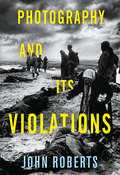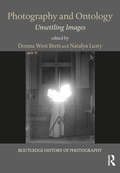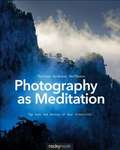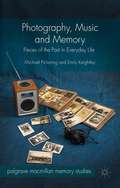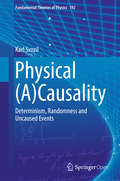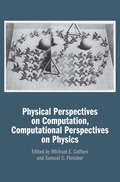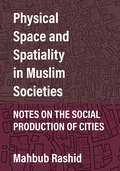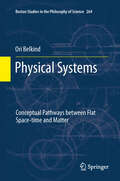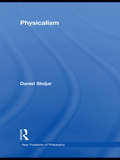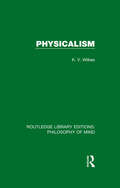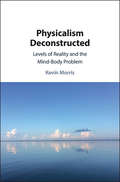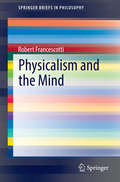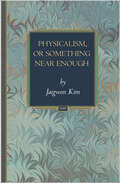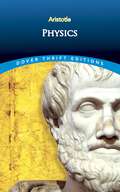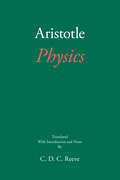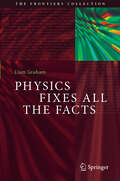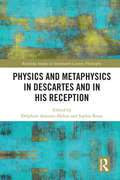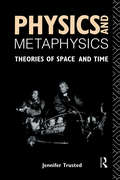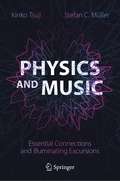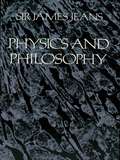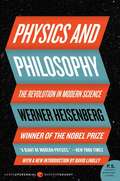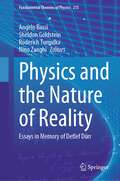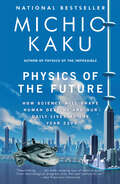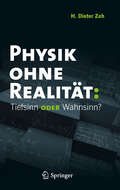- Table View
- List View
Photography and Its Violations (Columbia Themes in Philosophy, Social Criticism, and the Arts)
by John RobertsTheorists critique photography for "objectifying" its subjects and manipulating appearances for the sake of art. In this bold counterargument, John Roberts recasts photography's violating powers of disclosure and aesthetic technique as part of a complex "social ontology" that exposes the hierarchies, divisions, and exclusions behind appearances.The photographer must "arrive unannounced" and "get in the way of the world," Roberts argues, committing photography to the truth-claims of the spectator over the self-interests and sensitivities of the subject. Yet even though the violating capacity of the photograph results from external power relations, the photographer is still faced with an ethical choice: whether to advance photography's truth-claims on the basis of these powers or to diminish or veil these powers to protect the integrity of the subject. Photography's acts of intrusion and destabilization, then, constantly test the photographer at the point of production, in the darkroom, and at the computer, especially in our 24-hour digital image culture. In this game-changing work, Roberts refunctions photography's place in the world, politically and theoretically restoring its reputation as a truth-producing medium.
Photography and Ontology: Unsettling Images (Routledge History of Photography)
by Natalya Lusty Donna West BrettThis edited collection explores the complex ways in which photography is used and interpreted: as a record of evidence, as a form of communication, as a means of social and political provocation, as a mode of surveillance, as a narrative of the self, and as an art form. What makes photographic images unsettling and how do the re-uses and interpretations of photographic images unsettle the self-evident reality of the visual field? Taking up these themes, this book examines the role of photography as a revelatory medium underscored by its complex association with history, memory, experience and identity.
Photography as Meditation
by Torsten Andreas HoffmannFor many people, photography serves as a form of meditation; a way to separate themselves from their stressful lives. In this book, Torsten Andreas Hoffmann explores an approach to artistic photography based on Japanese Zen-Philosophy. Meditation and photography have much in common: both are based in the present moment, both require complete focus, and both are most successful when the mind is free from distracting thoughts. Hoffman shows how meditation can lead to the source of inspiration.Hoffman's impressive images of landscapes, cities, people, and nature, as well as his smart image analysis and suggestions about the artistic process, will help you understand this approach to photography without abandoning the principles of design necessary to achieve great images. Photographing busy scenes, especially, requires an inner calm that enables you to have intuition for the right moment and compose a well-balanced image amidst the chaos.The goal of this book is to develop your photographic expression. It provides enrichment for photographers who believe that only technical mastery produces great images and shows how important it is to engage with your own awareness to act creatively.
Photography, Music and Memory: Pieces of the Past in Everyday Life (Palgrave Macmillan Memory Studies)
by Michael Pickering Emily KeightleyThis book explores how photography and recorded music act as vehicles or catalysts in processes of remembering, and how they are regarded, treated, valued and drawn upon as resources connecting past and present in everyday life. It does so via two key concepts: vernacular memory and the mnemonic imagination.
Physical (A)Causality
by Karl SvozilThis open access book addresses the physical phenomenon of events that seem to occur spontaneously and without any known cause. These are to be contrasted with events that happen in a (pre-)determined, predictable, lawful, and causal way. All our knowledge is based on self-reflexive theorizing, as well as on operational means of empirical perception. Some of the questions that arise are the following: are these limitations reflected by our models? Under what circumstances does chance kick in? Is chance in physics merely epistemic? In other words, do we simply not know enough, or use too crude levels of description for our predictions? Or are certain events "truly", that is, irreducibly, random? The book tries to answer some of these questions by introducing intrinsic, embedded observers and provable unknowns; that is, observables and procedures which are certified (relative to the assumptions) to be unknowable or undoable. A (somewhat iconoclastic) review of quantum mechanics is presented which is inspired by quantum logic. Postulated quantum (un-)knowables are reviewed. More exotic unknowns originate in the assumption of classical continua, and in finite automata and generalized urn models, which mimic complementarity and yet maintain value definiteness. Traditional conceptions of free will, miracles and dualistic interfaces are based on gaps in an otherwise deterministic universe.
Physical Perspectives on Computation, Computational Perspectives on Physics
by Michael E. Cuffaro Samuel C. FletcherAlthough computation and the science of physical systems would appear to be unrelated, there are a number of ways in which computational and physical concepts can be brought together in ways that illuminate both. <P><P>This volume examines fundamental questions which connect scholars from both disciplines: is the universe a computer? Can a universal computing machine simulate every physical process? What is the source of the computational power of quantum computers? Are computational approaches to solving physical problems and paradoxes always fruitful? Contributors from multiple perspectives reflecting the diversity of thought regarding these interconnections address many of the most important developments and debates within this exciting area of research. Both a reference to the state of the art and a valuable and accessible entry to interdisciplinary work, the volume will interest researchers and students working in physics, computer science, and philosophy of science and mathematics.<P> Fills the gap in the book-length treatments of the interrelations between computation and physics, especially within philosophy.<P> Provides a reference point for the state of the art in important topics and research questions in this area.<P> Brings together scholars from a wide range of perspectives and disciplines.
Physical Space and Spatiality in Muslim Societies: Notes on the Social Production of Cities
by Mahbub RashidMahbub Rashid embarks on a fascinating journey through urban space in all of its physical and social aspects, using the theories of Foucault, Bourdieu, Lefebvre, and others to explore how consumer capitalism, colonialism, and power disparity consciously shape cities. Using two Muslim cities as case studies, Algiers (Ottoman/French) and Zanzibar (Ottoman/British), Rashid shows how Western perceptions can only view Muslim cities through the lens of colonization—a lens that distorts both physical and social space. Is it possible, he asks, to find a useable urban past in a timeline broken by colonization? He concludes that political economy may be less relevant in premodern cities, that local variation is central to the understanding of power, that cities engage more actively in social reproduction than in production, that the manipulation of space is the exercise of power, that all urban space is a conscious construct and is therefore not inevitable, and that consumer capitalism is taking over everyday life. Ultimately, we reconstruct a present from a fragmented past through local struggles against the homogenizing power of abstract space.
Physical Systems
by Ori BelkindBased on the concept of a physical system, this book offers a new philosophical interpretation of classical mechanics and the Special Theory of Relativity. According to Belkind's view the role of physical theory is to describe the motions of the parts of a physical system in relation to the motions of the whole. This approach provides a new perspective into the foundations of physical theory, where motions of parts and wholes of physical systems are taken to be fundamental, prior to spacetime, material properties and laws of motion. He defends this claim with a constructive project, deriving basic aspects of classical theories from the motions of parts and wholes. This exciting project will challenge readers to reevaluate how they understand the structure of the physical world in which we live.
Physicalism (New Problems of Philosophy)
by Daniel StoljarPhysicalism, the thesis that everything is physical, is one of the most controversial problems in philosophy. Its adherents argue that there is no more important doctrine in philosophy, whilst its opponents claim that its role is greatly exaggerated. In this superb introduction to the problem Daniel Stoljar focuses on three fundamental questions: the interpretation, truth and philosophical significance of physicalism. In answering these questions he covers the following key topics: a brief history of physicalism and its definitions what a physical property is and how physicalism meets challenges from empirical sciences ‘Hempel’s dilemma’ and the relationship between physicalism and physics physicalism and key debates in metaphysics and philosophy of mind, such as supervenience, identity and conceivability physicalism and causality. Additional features include chapter summaries, annotated further reading and a glossary of technical terms, making Physicalism ideal for those coming to the problem for the first time.
Physicalism (Routledge Library Editions: Philosophy of Mind)
by K. V. WilkesThe primary aim of this study is to dissolve the mind-body problem. It shows how the ‘problem’ separates into two distinct sets of issues, concerning ontology on the one hand, and explanation on the other, and argues that explanation – whether or not human behaviour can be explained in physical terms – is the more crucial. The author contends that a functionalist methodology in psychology and neurophysiology will prove adequate to explain human behaviour. Defence of this thesis requires: an examination of the mental/physical dichotomy, and its rejection in favour of a distinction between psychological and physical terms; a description and discussion of functionalism in psychology and neurophysiology, showing how the notorious problem of the necessary intensionality of psychological terms may be circumvented; an examination of the role of computer simulation in psycho-physical research; and an explanation of how the phenomena of sentience fit the functional framework. The book concludes that the thesis presented is in all essentials that of Aristotle; Aristotle had no ‘mind-body problem’, and were it not for a subsequent over-obsession with Cartesian scepticism, we need not have had one either.
Physicalism Deconstructed: Levels of Reality and the Mind–Body Problem
by Kevin MorrisHow should thought and consciousness be understood within a view of the world as being through-and-through physical? Many philosophers have proposed non-reductive, levels-based positions, according to which the physical domain is fundamental, while thought and consciousness are higher-level processes, dependent on and determined by physical processes. In this book, Kevin Morris's careful philosophical and historical critique shows that it is very difficult to make good metaphysical sense of this idea - notions like supervenience, physical realization, and grounding all fail to articulate a viable non-reductive, levels-based physicalism. Challenging assumptions about the mind-body problem and providing new perspectives on the debate over physicalism, this accessible and comprehensive book will interest scholars working in metaphysics, philosophy of mind, and philosophy of science.
Physicalism and the Mind
by Robert FrancescottiThis book addresses a tightly knit cluster of questions in the philosophy of mind. There is the question: Are mental properties identical with physical properties? An affirmative answer would seem to secure the truth of physicalism regarding the mind, i. e. , the belief that all mental phenomena obtain solely in virtue of physical phenomena. If the answer is negative, then the question arises: Can this solely in virtue of relation be understood as some kind of dependence short of identity? And answering this requires answering two further questions. Exactly what sort of dependence on the physical does physicalism require, and what is needed for a property or phenomenon to qualify as physical? It is argued that multiple realizability still provides irresistible proof (especially with the possibility of immaterial realizers) that mental properties are not identical with any properties of physics, chemistry, or biology. After refuting various attempts to formulate nonreductive physicalism with the notion of realization, a new definition of physicalism is offered. This definition shows how it could be that the mental depends solely on the physical even if mental properties are not identical with those of the natural sciences. Yet, it is also argued that the sort of psychophysical dependence described is robust enough that if it were to obtain, then in a plausible and robust sense of 'physical', mental properties would still qualify as physical properties.
Physicalism, or Something Near Enough (Princeton Monographs in Philosophy #19)
by Jaegwon KimContemporary discussions in philosophy of mind have largely been shaped by physicalism, the doctrine that all phenomena are ultimately physical. Here, Jaegwon Kim presents the most comprehensive and systematic presentation yet of his influential ideas on the mind-body problem. He seeks to determine, after half a century of debate: What kind of (or "how much") physicalism can we lay claim to? He begins by laying out mental causation and consciousness as the two principal challenges to contemporary physicalism. How can minds exercise their causal powers in a physical world? Is a physicalist account of consciousness possible? The book's starting point is the "supervenience" argument (sometimes called the "exclusion" argument), which Kim reformulates in an extended defense. This argument shows that the contemporary physicalist faces a stark choice between reductionism (the idea that mental phenomena are physically reducible) and epiphenomenalism (the view that mental phenomena are causally impotent). Along the way, Kim presents a novel argument showing that Cartesian substance dualism offers no help with mental causation. Mind-body reduction, therefore, is required to save mental causation. But are minds physically reducible? Kim argues that all but one type of mental phenomena are reducible, including intentional mental phenomena, such as beliefs and desires. The apparent exceptions are the intrinsic, felt qualities of conscious experiences ("qualia"). Kim argues, however, that certain relational properties of qualia, in particular their similarities and differences, are behaviorally manifest and hence in principle reducible, and that it is these relational properties of qualia that are central to their cognitive roles. The causal efficacy of qualia, therefore, is not entirely lost. According to Kim, then, while physicalism is not the whole truth, it is the truth near enough.
Physics (Dover Thrift Editions #Vol. 2)
by AristotleWritten in the fourth century BCE by Greek philosopher and scientist Aristotle, Physics set out to define the principles and causes of change, movement, and motion. For 2,000 years ― until discoveries by Galileo, Newton, and other scientists ― this treatise was the primary source for explanations of falling rocks, rising flames, the circulation of air, and other physical phenomena. Modern readers are required to bring a keen sense of criticism to these writings. Although Aristotle incorporated some degree of experience and observation in his thinking, the root of his reasoning lies in the philosophical approach. The brilliance of the philosopher's mind and his articulate manner of expression, together with the fact that he was among the first to undertake an intellectually rigorous investigation of nature's basic properties, contribute to the historic value of this book. It remains a foundational work of modern science and philosophy and a key to understanding the work of subsequent theorists and scholars.
Physics (The New Hackett Aristotle #Vol. 2)
by Aristotle C. D. ReeveThe Physics is a foundational work of western philosophy, and the crucial one for understanding Aristotle's views on matter, form, essence, causation, movement, space, and time. This richly annotated, scrupulously accurate, and consistent translation makes it available to a contemporary English reader as no other does—in part because it fits together seamlessly with other closely associated works in the New Hackett Aristotle series, such as the Metaphysics, De Anima, and forthcoming De Caelo and On Coming to Be and Passing Away. Eventually the series will include all of Aristotle's works. Sequentially numbered endnotes provide the information most needed at each juncture, while a detailed Index of Terms indicates places where focused discussion of key notions occurs. An illuminating general Introduction describes the book that lies ahead, explaining what sort of work it is and what sorts of evidence it relies on.
Physics Fixes All the Facts (The Frontiers Collection)
by Liam GrahamComplex systems seem to magically emerge from the interactions of their parts. A whirlpool emerges from water molecules. A living cell from organic molecules. You emerge from the cells of your body. Not since chaos has a concept from physics spread like wildfire to other disciplines. Emergence can be found from chemistry to economics; from psychology to ecology. At its heart is the alluring idea that there’s more to the world than physics, that there is a holistic component to nature, an edge of mystery. “Physics Fixes All the Facts” starts by taking you on a tour through a fascinating world of complexity, exploring phenomena from the inside of an atomic nucleus to bacterial behaviour to the ability of your thoughts to affect the world. These examples are used along with a thorough exploration of the philosophical literature to untangle the notoriously poorly defined concept of emergence. This reveals something surprising: the term emergence is redundant. In its weak form it is so weak that it applies to everything. In its strong form it is so restrictive that it is like the belief that there are pixies in your garden, impossible to exclude but not worth spending your time on. Emergence either applies to all systems or to none. Rather than telling us something about the nature of the world, it is an illusion, an artefact of our cognitive limitations. The past decade has seen a dozen or so monographs and collections about emergence, almost all resolutely supportive of the concept. This book aims to redress the balance. But it is more than just a campaign against the idea of emergence. Graham presents a framework called Austere Physicalism and argues that it is the only coherent way to view the world. He uses this framework to reinterpret so-called emergent phenomena and investigates its wider implications for science. In this radically materialist view, we are nothing but physical systems among others. “Physics Fixes All the Facts” ends by exploring what this means for our sense of free will and consciousness. The book will appeal to academics in fields which use the concepts of complexity or emergence. Scientists and philosophers alike will find unexpected and exciting ideas in these pages. But the target audience is much broader including students who want to add context to their studies and the intellectually curious with some scientific background.
Physics and Metaphysics in Descartes and in his Reception (Routledge Studies in Seventeenth-Century Philosophy)
by Sophie Roux Delphine Antoine-MahutThis volume explores the relationship between physics and metaphysics in Descartes’ philosophy. According to the standard account, Descartes modified the objects of metaphysics and physics and inverted the order in which these two disciplines were traditionally studied. This book challenges the standard account in which Descartes prioritizes metaphysics over physics. It does so by taking into consideration the historical reception of Descartes and the ways in which Descartes himself reacted to these receptions in his own lifetime. The book stresses the diversity of these receptions by taking into account not only Cartesianisms but also anti-Cartesianisms, and by showing how they retroactively highlighted different aspects of Descartes’ works and theoretical choices. The historical aspect of the volume is unique in that it not only analyzes different constructions of Descartes that emerged in the 18th, 19th and 20th centuries, but also reflects on how his work was first read by philosophers across Europe. Taken together, the essays in this volume offer a fresh and up-to-date contribution to this important debate in early modern philosophy.
Physics and Metaphysics: Theories of Space and Time
by Jennifer TrustedJennifer Trusted's new book argues that metaphysical beliefs are essential for scientific inquiry. The theories, presuppositions and beliefs that neither science nor everyday experience can justify are the realm of metaphysics, literally `beyond physics'. These basic beliefs form a framework for our activities and can be discovered in science, common sense and religion. By examining the history of science from the eleventh century to the present, this book shows how religious and mystical beliefs, as well as philosophical speculation have had a considerable role in motivating scientists and inspiring scientific inquiry. Physics and Metaphysics presupposes no technical knowledge of either philosophy or science. It is an ideal introduction to science and the important forces that have shaped its history and ideas.
Physics and Music: Essential Connections and Illuminating Excursions
by Stefan C. Müller Kinko TsujiThis book explores the fascinating and intimate relationship between music and physics. Over millennia, the playing of, and listening to music have stimulated creativity and curiosity in people all around the globe. Beginning with the basics, the authors first address the tonal systems of European-type music, comparing them with those of other, distant cultures. They analyze the physical principles of common musical instruments with emphasis on sound creation and particularly charisma. Modern research on the psychology of musical perception – the field known as psychoacoustics – is also described. The sound of orchestras in concert halls is discussed, and its psychoacoustic effects are explained. Finally, the authors touch upon the role of music for our mind and society. Throughout the book, interesting stories and anecdotes give insights into the musical activities of physicists and their interaction with composers and musicians.
Physics and Philosophy
by James JeansCan we have any knowledge of the world outside us other than we gain by the methods of science? Are we humans endowed with free will, or are we mere cogs in a vast machine that must follow its predestined course until it finally runs down? Is the world we perceive the world of ultimate reality, or is it only a curtain veiling a deeper reality beyond?In this strikingly lucid and often poetic book, one of the twentieth century's greatest scientists grapples with these age-old questions, achieving in the process a brilliant and non-technical exposition of the interrelationship between physics and philosophy. He begins by defining physics and philosophy, pointing out the difference in their respective attempts to explain physical reality and man's place in it. This discussion paves the way for an outline of epistemological methods in which the rationalism of thinkers like Descartes, Leibniz, and Kant is compared to the empiricism of Locke and Hume.Over the course of the book, in a manner that is careful and methodic but never dull, Jeans marshals the evidence for his startling conclusion: recent discoveries in astronomy, mathematics, sub-atomic physics, and other disciplines have washed away the scientific basis of many older philosophic discussions. Such long-standing problems as causality, free will and determinism, the nature of space and time, materialism and mentalism must be considered anew in the light of new knowledge and information attained by twentieth-century physical science. Even then, however, Jeans cautions against drawing any positive conclusions, pointing out that both physics and philosophy are both relatively young and that we are still in Newton's words, like children playing with pebbles on the sea-shore, while the great ocean of truth rolls, unexplored, beyond our reach.Although first published in 1943, nothing in physics has happened to affect Jeans's account in this book; it remains remarkably fresh and undated, a classic exposition of the philosophical implications of scientific knowledge.
Physics and Philosophy
by Werner HeisenbergThe seminal work by one of the most important thinkers of the twentieth century, Physics and Philosophy is Werner Heisenberg's concise and accessible narrative of the revolution in modern physics, in which he played a towering role. The outgrowth of a celebrated lecture series, this book remains as relevant, provocative, and fascinating as when it was first published in 1958. A brilliant scientist whose ideas altered our perception of the universe, Heisenberg is considered the father of quantum physics; he is most famous for the Uncertainty Principle, which states that quantum particles do not occupy a fixed, measurable position. His contributions remain a cornerstone of contemporary physics theory and application.
Physics and Philosophy: Philosophical Papers Volume 4
by Joseph Agassi Stefano Gattei Paul K. FeyerabendThis collection of the writings of Paul Feyerabend is focused on his philosophy of quantum physics, the hotbed of the key issues of his most debated ideas. Written between 1948 and 1970, these writings come from his first and most productive period. These early works are important for two main reasons. First, they document Feyerabend's deep concern with the philosophical implications of quantum physics and its interpretations. These ideas were paid less attention in the following two decades. Second, the writings provide the crucial background for Feyerabend's critiques of Karl Popper and Thomas Kuhn. Although rarely considered by scholars, Feyerabend's early work culminated in the first version of Against Method. These writings guided him on all the key issues of his most well-known and debated theses, such as the incommensurability thesis, the principles of proliferation and tenacity, and his particular version of relativism, and more specifically on quantum mechanics. Feyerabend is one of the most important contemporary philosophers of science: his work continues to be discussed and his provocative style still challenges philosophers nowadays. Provides the first comprehensive picture of Feyerabend's works on the philosophy of physics. Makes available in English, for the first time, a few key works which were originally published in German, as well as an unpublished article. The papers originally published in English are not always readily available to scholars
Physics and the Nature of Reality: Essays in Memory of Detlef Dürr (Fundamental Theories of Physics #215)
by Angelo Bassi Roderich Tumulka Sheldon Goldstein Nino ZanghìThis volume commemorates the scientific contributions of Detlef Dürr (1951–2021) to foundational questions of physics. It presents new contributions from his former students, collaborators, and colleagues about their current research on topics inspired or influenced by Dürr. These topics are drawn from physics, mathematics, and philosophy of nature, and concern interpretations of quantum theory, new developments of Bohmian mechanics, the role of typicality, quantum physics in relativistic space-time, classical and quantum electrodynamics, and statistical mechanics. The volume thus also gives a snapshot of present research in the foundations of physics.
Physics of the Future: How Science Will Shape Human Destiny and Our Daily Lives by the Year 2100
by Michio KakuNATIONAL BESTSELLER • The renowned theoretical physicist and national bestselling author of The God Equation details the developments in computer technology, artificial intelligence, medicine, space travel, and more, that are poised to happen over the next century. &“Mind-bending…. [An] alternately fascinating and frightening book.&” —San Francisco ChronicleSpace elevators. Internet-enabled contact lenses. Cars that fly by floating on magnetic fields. This is the stuff of science fiction—it&’s also daily life in the year 2100.Renowned theoretical physicist Michio Kaku considers how these inventions will affect the world economy, addressing the key questions: Who will have jobs? Which nations will prosper? Kaku interviews three hundred of the world&’s top scientists—working in their labs on astonishing prototypes. He also takes into account the rigorous scientific principles that regulate how quickly, how safely, and how far technologies can advance. In Physics of the Future, Kaku forecasts a century of earthshaking advances in technology that could make even the last centuries&’ leaps and bounds seem insignificant.
Physik ohne Realität: Tiefsinn oder Wahnsinn?
by H. Dieter ZehBeschreiben die Begriffe der modernen Physik tatsächlich die Realität oder sind sie nur Hilfsmittel und Rechenwerkzeuge? Wie können reale Objekte aus Atomen aufgebaut sein, wenn diese angeblich gar keine realen Eigenschaften vor deren Messung besitzen? In philosophischen und meist allgemein verständlichen Aufsätzen setzt sich der Autor - Begründer des Dekohärenzkonzepts in der Quantentheorie - mit den "faulen Ausreden" auseinander, die Physiker finden, um unerwarteten Konsequenzen, die sich aus ihren eigenen Theorien ergeben, aus dem Weg zu gehen.
